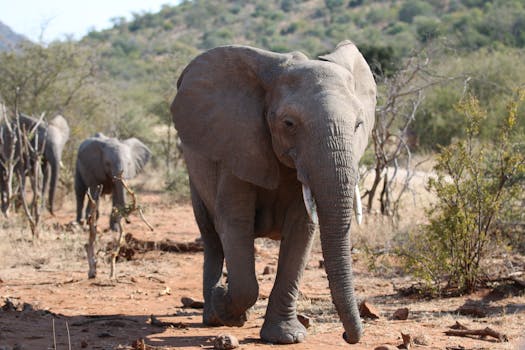happpy.news is an open source project, made with ♥ by reuben armstrong
and powered by this advert ^ from charity.marketing
Kenya's 'Elephant Queen', one of Africa's oldest and largest elephants, is a symbol of the country's successful wildlife conservation efforts. Her survival against poaching demonstrates the effectiveness of Kenya's strict anti-poaching laws.

In the heart of Kenya's stunning landscapes roams the majestic 'Elephant Queen', a symbol of resilience and hope in the fight against wildlife poaching. This remarkable elephant, one of Africa's oldest and largest, has become an icon for conservationists and animal lovers alike. Her story is not just about survival; it represents the successful efforts of Kenya’s wildlife conservation initiatives, showcasing the power of perseverance and community involvement.
Poaching has long been a significant threat to elephants, driven by the illegal ivory trade and habitat loss. However, Kenya has made substantial strides in combating this crisis through rigorous anti-poaching laws and community awareness programs. The 'Elephant Queen’ serves as a living testament to these efforts, having endured various challenges throughout her life, including poaching attempts that have claimed the lives of many of her kin.
The Kenya Wildlife Service (KWS) has played a pivotal role in protecting elephants and other wildlife. With strict enforcement of anti-poaching laws and increased penalties for offenders, the country has seen a notable decrease in poaching incidents over the years. The 'Elephant Queen' is a visible reminder of the positive impact these measures can have, as she continues to roam her natural habitat, a symbol of hope for future generations of elephants.
In addition to law enforcement, community engagement has been crucial in conservation efforts. Local communities are increasingly recognizing the economic benefits of preserving wildlife, particularly through eco-tourism. Organizations, such as Save the Elephants, work tirelessly to educate and involve communities in conservation strategies, fostering a sense of ownership over the wildlife that shares their environment. This approach has led to a significant reduction in poaching and has empowered locals to protect their natural heritage.
Moreover, the story of the 'Elephant Queen' highlights the importance of habitat preservation. As human populations grow and encroach on wildlife territories, the need to protect natural habitats becomes urgent. Conservation programs focused on habitat restoration and protection not only benefit elephants but also support a myriad of other species, enhancing biodiversity and ecosystem health.
The resilience of the 'Elephant Queen' also serves as a powerful narrative in the global conversation about wildlife conservation. Her survival against the odds inspires both local and international communities to advocate for stronger protective measures and increased funding for conservation initiatives. The attention she garners brings awareness to the plight of elephants worldwide, urging people to join the fight against poaching and habitat loss.
As we celebrate the 'Elephant Queen', we are reminded of the collective responsibility we share in protecting our planet's wildlife. Her story is not just one of survival but a beacon of hope for conservation efforts everywhere. By supporting initiatives that prioritize the safety and preservation of wildlife, we can ensure that future generations will also have the privilege of witnessing these magnificent creatures in their natural habitats.
In conclusion, the 'Elephant Queen' stands tall as a symbol of what can be achieved through dedication, community involvement, and effective policy. Her legacy is a call to action, urging us all to come together to protect our world's wildlife. With continued efforts, we can foster a future where elephants and other endangered species thrive alongside human communities, ensuring a rich and diverse natural world for years to come.
Source: BBC News